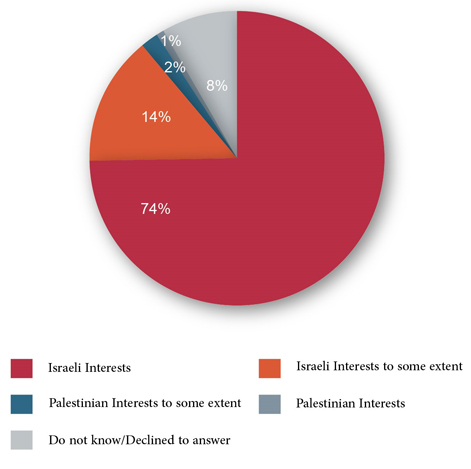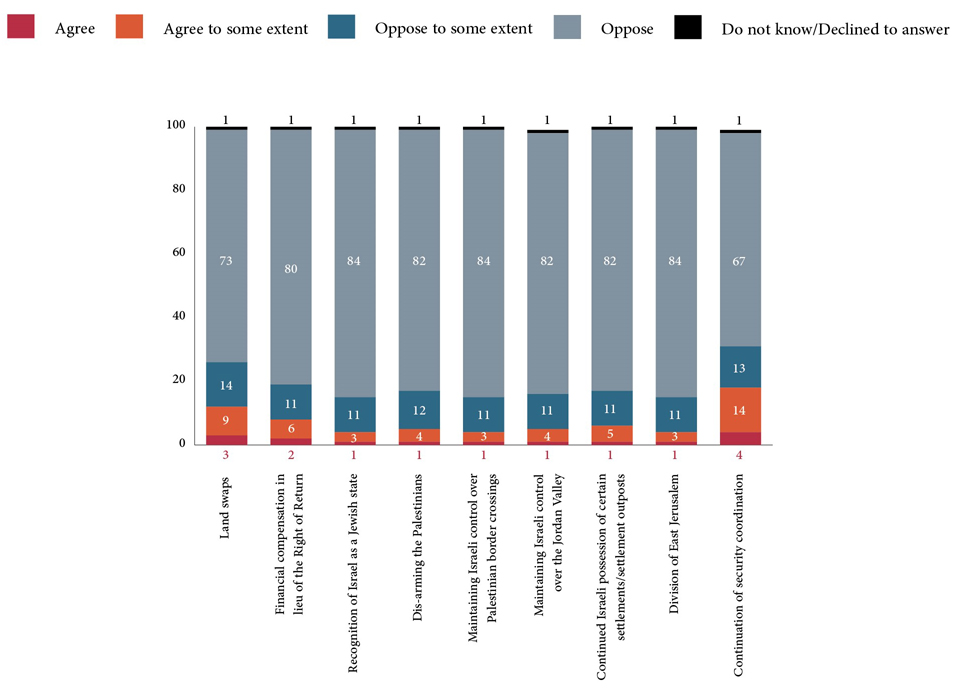 |
| Figure 1: Respondents' perceptions of whose interests would be served by Kerry’s framework agreement |
The results form part of the 2014 Arab Opinion Index, an annual survey conducted by the ACRPS, which was conducted in Palestine between January 24 and February 2, 2014. The study relied on a sample of 1,520 respondents living in both the West Bank and the Gaza Strip. Respondents took part through face-to-face interviews, and were chosen using a multi-staged cluster approach, giving a representative, self-weighted sample of the Palestinian population in the Occupied Territories. The confidence level for the results reported here was 97.5% with a margin of error of ±2%.
The results within Palestine further demonstrate that Palestinians are almost unanimous in their rejection of offering further concessions to the Israelis, such as the recognition of Israel as a Jewish state; acceptance of (financial) compensation in lieu of the right of return; land swaps; or the upholding of Israeli control over Palestinian border crossings. Such results clearly demonstrate that Palestinian public opinion views Israeli conditions for a peace agreement as a violation of their rights and national principles. While all of these conditions are frequently presented by the Israelis as criteria for the achievement of a final peace agreement, Palestinian opposition to them is widespread.
 |
|
Figure 2: Respondents' agreement to/opposition toward a variety of Israeli preconditions to a peace treaty
|
This year’s survey also sought to elucidate Palestinian attitudes toward the internal political split between Hamas and Fatah, with respondents expressing the view that a number of obstacles have thus far prevented Palestinian national reconciliation. Foremost among these factors, according to the results, are the partisan and personal interests of the leaders of Palestinian political factions, the Israeli occupation, and intervention by foreign powers. Four percent of Palestinian respondents placed the blame for the failure to achieve national reconciliation on the Fateh leadership and the Palestinian National Authority (the West Bank government), while a similar figure of 4% blamed the Hamas leadership and the government in Gaza.
Table 1: The first and second most significant obstacles to Palestinian national reconciliation as described by respondents.

Thirty-eight percent of Palestinians believe that the most significant step toward the realization of national reconciliation would be the re-structuring of the Palestine Liberation Organization (PLO). A further 28% viewed holding legislative elections as the most important step toward achieving national reconciliation. Finally, 24% indicated that holding presidential elections was the most important step to achieving that aim.
Table 2: Respondents' evaluation of the most important measures to be taken in order to achieve of Palestinian national reconciliation.

The Arab Opinion Index is the largest survey of its kind in terms of number of respondents (around 20,000 for 2014). It aims to understand trends in Arab public opinion on a number of social, political, and economic issues, including public attitudes toward democracy, political, and civic participation, and respondents’ evaluations of institutions in their home countries. The ACRPS undertakes this annual survey in every Arab country where doing so is possible. An announcement of the final and full results for 2014, the third annual poll, is expected at the beginning of June 2014.
To read the full Report, click here, or on the image below.